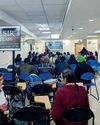
Q. Recently, Plaksha partnered with the Indian Institute of Science (IISc) to foster faculty and student mobility. How is this partnership shaping up? What other partnerships are in the pipeline?
A. With the IISc we signed a memorandum of understanding (MoU) recently, although the work has been happening ever since we came into existence. Plaksha has an undergraduate major in robotics and cyber-physical systems and IISc has a cyber-physical systems centre, the oldest in the country. It is now 10 years old and has received a generous grant from Robert Bosch Foundation, Germany. I was connected to the centre during my tenure at the IISc. When I came to Plaksha, my immediate thought was to work with the centre.
IISc also has a Centre of Nanoscience and Engineering which has modern laboratory fabrication facilities and it's hard for any institution to build it. This is a world-class centre and you can't replicate it. Universities need to collaborate and use these facilities rather than replicating them. For instance, we have good maker's systems here. In robotics and cyber-physical systems, it's important to build what you dream of quickly. But for that, you need several machines and technologies. It's not prototyping that could be done with 3D printers. These machines are available at Plaksha's Makerspace easily. This is valuable to IISc students and faculty.
Q. Plaksha states it intends to reimagine engineering education, entrepreneurship and innovation and solving India's grand challenges. What initiatives have you planned to achieve these goals?
This story is from the {{IssueName}} edition of {{MagazineName}}.
Start your 7-day Magzter GOLD free trial to access thousands of curated premium stories, and 9,000+ magazines and newspapers.
Already a subscriber ? Sign In
This story is from the {{IssueName}} edition of {{MagazineName}}.
Start your 7-day Magzter GOLD free trial to access thousands of curated premium stories, and 9,000+ magazines and newspapers.
Already a subscriber? Sign In

Sleeper Cells: Law schools' 'dormant' legal aid clinics
A law college survey by the Supreme Court's policy centre found that a worrying number of legal aid clinics do little more than hold legal awareness camps, despite NALSA, BCI rules. This leaves gaps in legal education

Law's new niche frontiers
How niche law programmes are blending science with legal expertise, transforming legal education and creating specialised career paths

'GP Sir's classes' a ray of hope for the poor
Shrishti (name changed), 31, hails from the Valmiki community based in Gurdaspur, Punjab; she was born into a family of safai karamcharis - cleaners and at 21, married into another.

DU Law Faculty is part of CLAT 2025 but plans own exam: Dean
Delhi University's Faculty of Law will admit to its BBA LLB and BA LLB courses through the CLAT exam this year.

Studying law through films, novels, comics
Law schools are using various art forms - films, comics, theatre, puppetry

Legal education meets AI
As artificial intelligence reshapes industries, India’s leading law schools are introducing specialised courses and research initiatives, often in collaboration with technical institutions. But the need for comprehensive regulations persists

A LEGACY IN CRISIS
Asia's oldest law college and alma mater to legal luminaries, Government Law College, Mumbai, now grapples with declining standards, administrative apathy, and students' shifting educational aspirations

Law Colleges for 2025
Careers360 has ranked 100 law colleges and rated over 185 institutions, categorising them into distinct zones and states, for a comprehensive overview of legal education

IIT Madras introduces another quota
After admitting five students via the sports quota in 2024-25 - a first among the IITs Indian Institute of Technology Madras has now introduced another quota for \"fine arts and culture excellence\".

CLAT answer keys and court cases
Many Common Law Admission Test (CLAT) candidates claimed to find mistakes in its provisional and final answer keys.